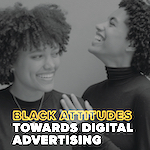 |
To reach Black consumers, brands must not only create content that addresses the issues those consumers care about, they also need to place their messages in media that are seen as culturally relevant by Black audiences, a new report from B Code finds.
More than four in 10 respondents (42 percent) said they respond more favorably to culturally relevant marketing content when it is placed on a “cultural website,” as opposed to a general-audience platform, where they can feel out of place.
“Leveraging talent that reflects the diversity of the Black community” was seen as very important by the survey respondents. More than three-quarters (76 percent) of them said an ad would be more likely to get their attention if it represented people like them. Other major draws included “stories of real people that are from the same ethnic group” (64 percent) and “music or other art that related to their ethnic/racial group” (50 percent).
A celebrity (67 percent) or influencer (65 percent) from their ethnic/racial group was also mentioned by respondents as a factor that would encourage them to be responsive to brand content.
As regards format, they showed a strong interest in audio and video content, with 72 percent saying they are likely to see digital content on an app, and social media close behind at 70 percent. More than half (54 percent) said they are likely to click on a digital ad, with 45 percent adding that they’d like to see more interactive video and other innovative models.
Data privacy was another concern, with 54 percent of respondents agreeing that “my identity should be protected at all times.” However, 54 percent also said that they considered ads targeted at them to be valuable, with 48 percent noting they understand that ads are often targeted to them through their online behavior.
To close the gap between Black consumers and brands, B Code general Damian Benders said that communicators “must work from the ground up to tailor genuine and respectful messaging that effectively reaches and connects with Black audiences.”
The “Black Attitudes Towards Digital Advertising” study surveyed 569 Black respondents between March 17 and 22. 2021, representing all main geographical areas of the United States.


 The Great Blue Wall Initiative, a global conservation effort aimed at presevering marine ecosystems and promoting sustainable ocean use, wants proposals from marketing and branding firms.
The Great Blue Wall Initiative, a global conservation effort aimed at presevering marine ecosystems and promoting sustainable ocean use, wants proposals from marketing and branding firms. The Florida Department of Transportation wants to hear from firms interested in providing public outreach for its various construction projects.
The Florida Department of Transportation wants to hear from firms interested in providing public outreach for its various construction projects. Redmond, a city of 77K people located less than 20 miles from downtown Seattle, wants a roster of firms to develop crisis communication plans, and be ready to answer the call in the event that an emergency hits.
Redmond, a city of 77K people located less than 20 miles from downtown Seattle, wants a roster of firms to develop crisis communication plans, and be ready to answer the call in the event that an emergency hits. The Iowa Economic Development Authority is looking for a firm to handle its $5M annual strategic marketing and communications budget.
The Iowa Economic Development Authority is looking for a firm to handle its $5M annual strategic marketing and communications budget. Colorado is accepting the qualifications of PR firms, ad agencies and marketing services companies that are interested in working for The Centennial State.
Colorado is accepting the qualifications of PR firms, ad agencies and marketing services companies that are interested in working for The Centennial State.


 Have a comment? Send it to
Have a comment? Send it to 
Oct. 21, 2021, by Joe Honick
Excuse me, but is there anything new about the idea of selecting media, messages and appropriate applications that relate to specific markets. The only real problem with this advice is that it may well work to further the separation of racial thinking since the natural opposite of what is presented here is doing all the same stuff as if marketing to Whites suggests they are part of some community of "similars." These findings as reported and promoted also carry the need for some careful thinking.